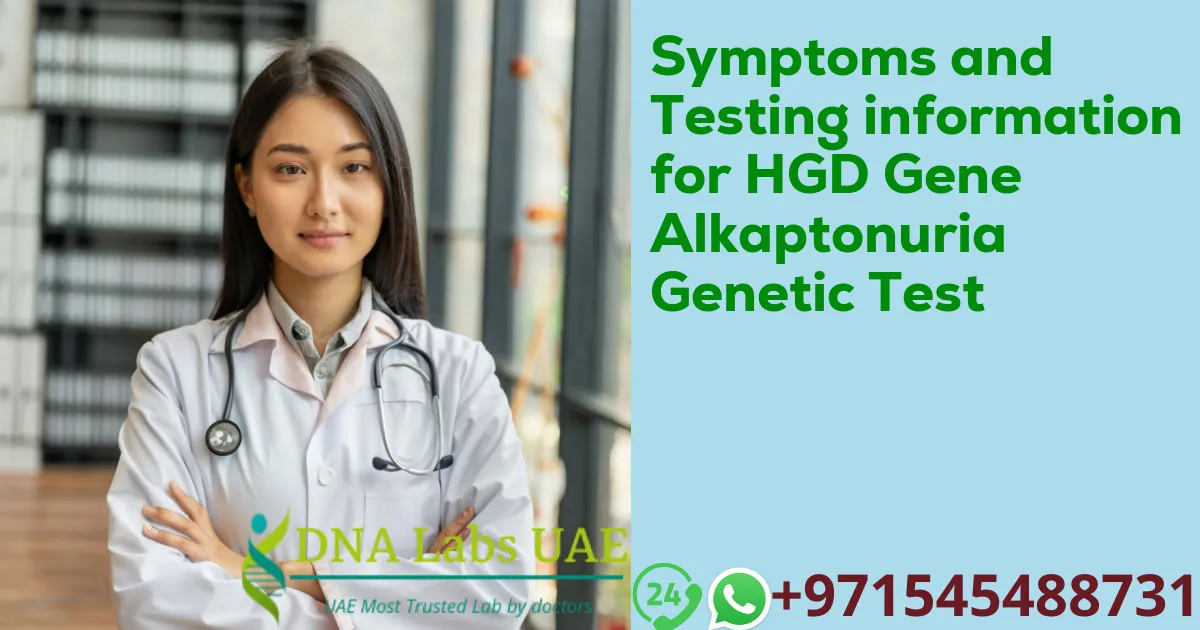Alkaptonuria, a rare genetic disorder, affects one in every 250,000 to 1 million individuals worldwide. This condition arises due to a deficiency in the enzyme homogentisate 1,2-dioxygenase (HGD), which is crucial for breaking down the amino acids tyrosine and phenylalanine. The lack of this enzyme’s activity leads to the accumulation of homogentisic acid in the body, causing damage to various organs and leading to the characteristic symptoms of Alkaptonuria. The genetic basis of this condition makes the HGD Gene Alkaptonuria Genetic Test an essential tool for accurate diagnosis and management.
Symptoms of Alkaptonuria
Alkaptonuria presents with a range of symptoms that usually become evident in adulthood, typically around the age of 30. However, some signs can appear earlier. Key symptoms include:
- Darkening of the urine: When exposed to air, the urine may turn dark brown or black, which is often the first sign noticed.
- Arthritis: Early-onset osteoarthritis, especially in the spine and large joints, is common, causing pain and stiffness.
- Heart problems: Accumulation of homogentisic acid can lead to heart valve issues, such as aortic or mitral valve stenosis, and other cardiovascular complications.
- Skin and eye changes: The sclera of the eyes may darken, and there can be bluish-black pigmentation of the ear cartilage and other areas of the skin exposed to the sun.
- Prostate stones or kidney stones: These can occur due to the accumulation of homogentisic acid crystals in these organs.
Understanding the HGD Gene Alkaptonuria Genetic Test
The HGD Gene Alkaptonuria Genetic Test is a specialized diagnostic tool designed to identify mutations in the HGD gene responsible for Alkaptonuria. This test is crucial for confirming the diagnosis, especially in individuals who exhibit symptoms of the disorder. It involves collecting a DNA sample, typically through a blood draw or a cheek swab, which is then analyzed in the laboratory for the presence of specific genetic mutations.
Importance of Early Diagnosis and Management
Early diagnosis of Alkaptonuria is vital for managing the condition effectively and preventing or mitigating the severity of its complications. While there is no cure for Alkaptonuria, treatments are available to help manage symptoms and improve quality of life. These may include pain management strategies, physical therapy, and, in some cases, surgery to replace damaged joints. Dietary modifications and certain supplements may also help slow the progression of the disease.
Test Cost and Accessibility
The cost of the HGD Gene Alkaptonuria Genetic Test is 4400 AED. While the price may seem significant, the value of an accurate diagnosis cannot be overstated, as it opens the door to appropriate management and treatment strategies. Individuals showing symptoms of Alkaptonuria or those with a family history of the condition are encouraged to consider this test.
For more information about the HGD Gene Alkaptonuria Genetic Test and to schedule a test, please visit DNA Labs UAE.
Conclusion
Alkaptonuria is a rare but impactful genetic disorder that necessitates early detection for effective management. The HGD Gene Alkaptonuria Genetic Test plays a pivotal role in diagnosing this condition, providing individuals and their healthcare providers with crucial information for managing the disease. With advancements in genetic testing, individuals now have access to precise diagnostics like never before, paving the way for better health outcomes and an improved quality of life.



